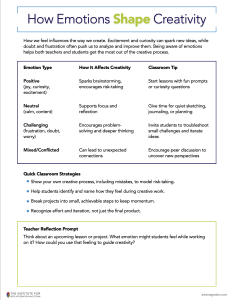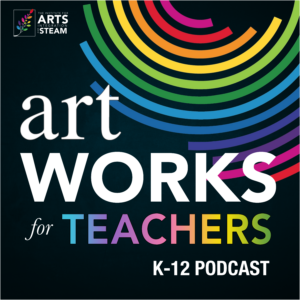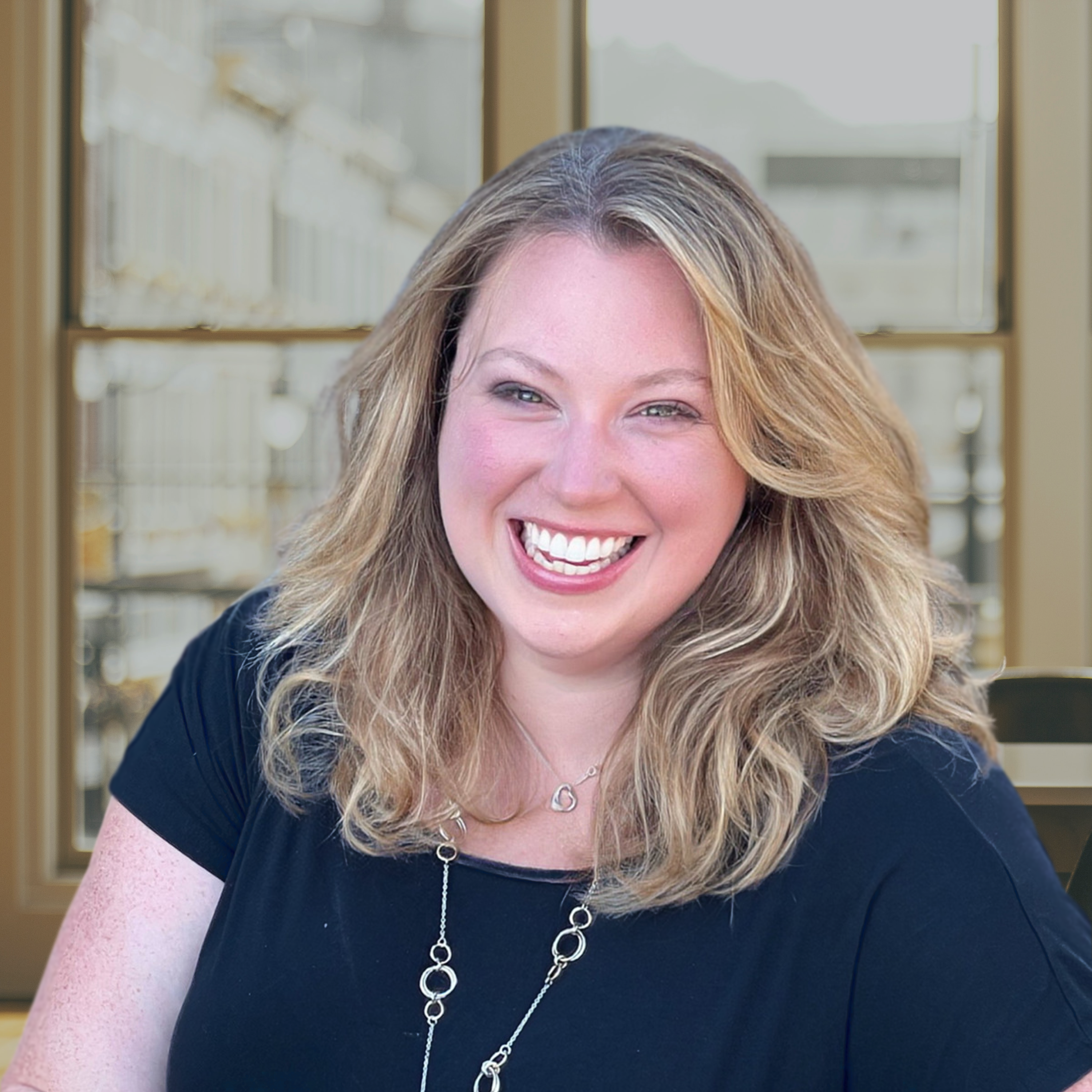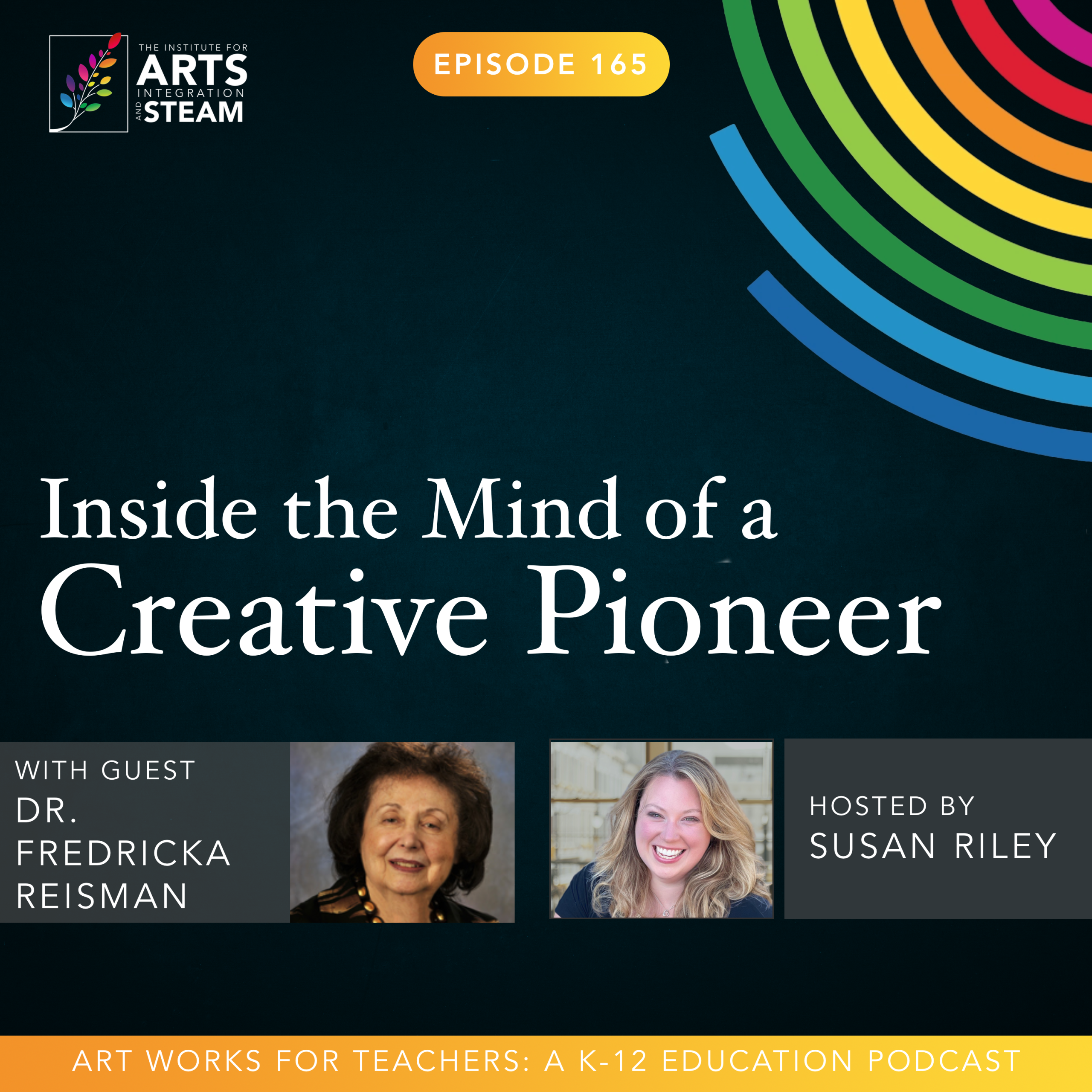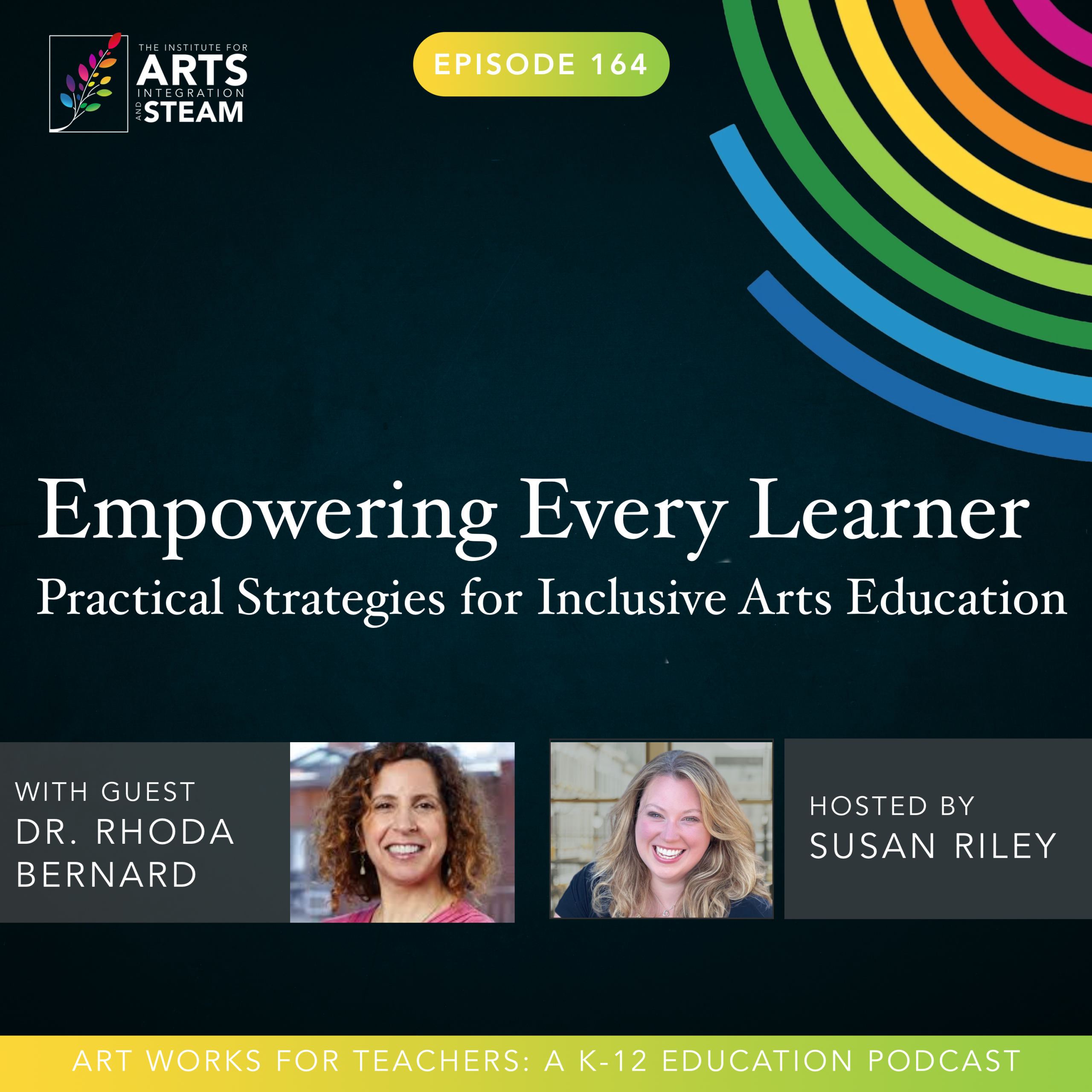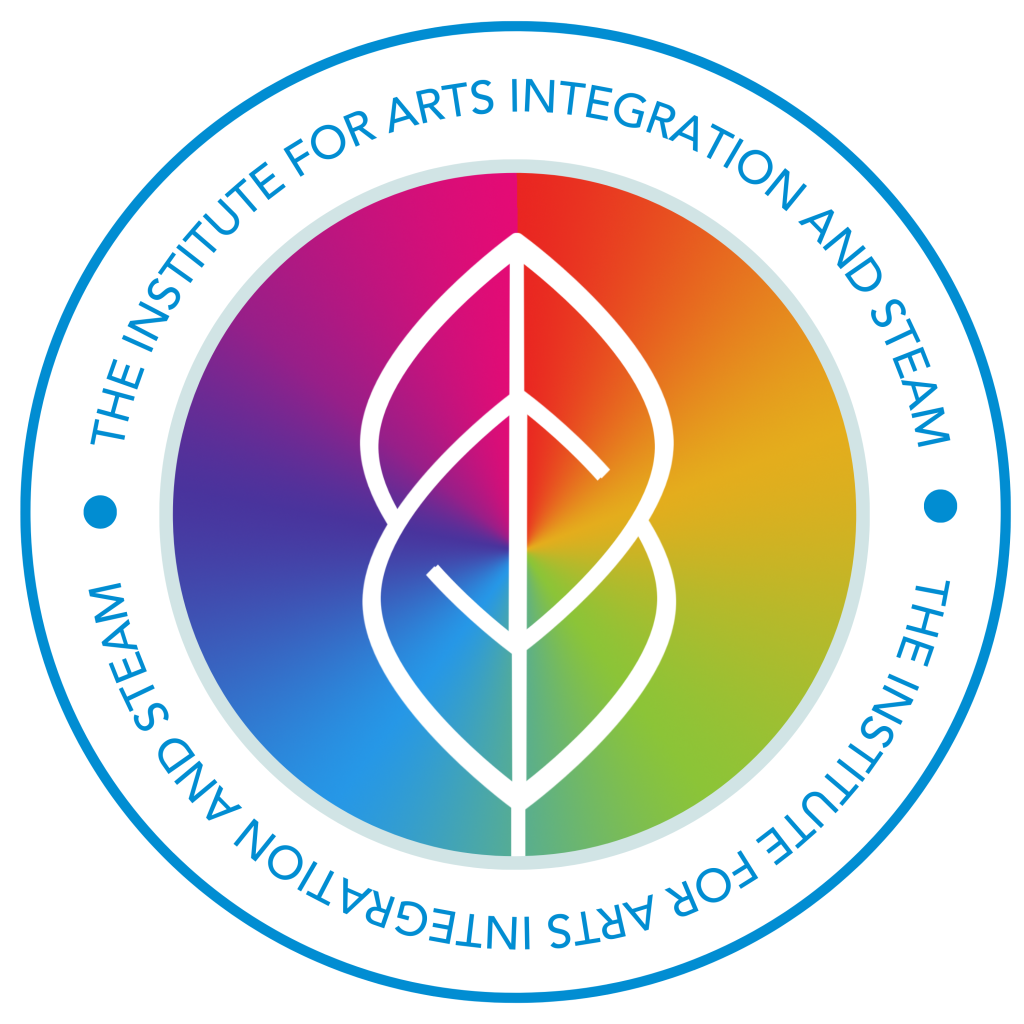ART WORKS FOR TEACHERS PODCAST | EPISODE 155 | 31:42 MIN
Creativity in Action: Turning Ideas into Results
Enjoy this free download of the How Emotions Shape Creativity resource.
Well, welcome to the show, Zorana. I'm so excited that you're here.
Zorana
Thank you for having me.
Susan
Of course, of course. So can you tell us a little bit about yourself and what drew you to studying creativity?
Zorana
Well, I am a research scientist. I have been doing research my whole career and I started out being interested in doing basic scientific work, you know, very technical in nature. And as life has it, you know, I got a big project that was very much about education. It was about how do we teach creativity skills, how do we teach people about that messy side of those emotional challenges and that roller coaster we go through? And at the time, I was not so sure that I wanted to do that. You know how life goes. But as one thing goes to another, and I know the importance of openness for creativity.
I have seen what a difference it can make. And it completely changed my approach to work. I became very interested in communicating about science, in saying people, there are some things we know, and about thinking how it can be applied. And that's how I ended up writing a book, The Creativity Choice, which is taking us through that messy process of saying, what are some barriers? Then what are the strategies you need to know and how to keep it being more than just, you know, one hit wonder. You did one creative thing, but now you want to continue that.
Susan
What I find fascinating about this and especially about your kind of juxtaposition is that sometimes people don't think of science and creativity linking, right? They feel like creativity is so messy and very artistic and that's a separate side from science. And what you do so well, Zorna, is bridge that gap, show us the actual science behind it and that there is a structure almost to the messiness, right? Yeah.
Zorana
Yeah, I really like how you put that is that we have that very immediate association between creativity and art, creativity and design, all of these artistic-ish fields. And they certainly are creative, but they are not the only place where creativity exists. And I wanted to open that up and say to people, yeah, your first association is not wrong but it's not the only one. Let's go beyond that. Let's see how this is relevant to your life. And then what science can teach us so that we can have some trust that this is replicable, that this is something that we can put into practice.
Susan
Yeah, and one of the things that you do in the book so well is show how creativity is a series of decisions and actions, not just inspiration. Can you dive into that a little bit more deeply for us and give us an example maybe?
Zorana
Well, we just mentioned art. So let's take an art example. This summer I have visited Monet's gardens and it was beautiful and it made me think of his art. And then we went and visited the cathedral he painted. And we celebrate a great artist, but we don't celebrate him having an idea to paint the cathedral at different times of day, to see how light changes this object. We celebrate him doing it, us seeing it and interacting with it. So it's not just about inspiration, it's not just about having the idea, it is doing something with that idea that then has an influence on the world.
Susan
So powerful and thinking about that action. So you're saying that the action itself is the creative process, right?
Zorana
Yeah, action itself is the creative process. Sometimes it doesn't feel that we are doing something creative because there's this phrase we use in everyday life. I feel creative. But when we say that, we imply a very narrow thing. Again, we imply inspiration. But creativity is much more than that. There are times when you are doing creative work, but it is really difficult.
It is really solving problems. It is dealing with challenges. It is dealing with being stuck with obstacles. And that doesn't feel creative, but it is necessary to get there.
Susan
Yeah, why do feel like the actions, taking action is so much harder than creative inspiration?
Zorana
Inspiration is fun. Inspiration is pure joy. It is, it feels like magic. Okay, I'm a scientist, I'm using the word magic. What is that about? Because that is the feeling of it. It can sometimes seem that it comes over you from, you know, the muses or whatever metaphor we want to use out of nowhere, essentially.
And that is surprising, that is beautiful, that is all the wonderful adjectives of the world. But that only stays with imagination, important, not enough. With fantasy, really important, can do wonderful things for your wellbeing, but not enough if you want to end up with something, end up with something tangible like a performance or a product, something that you have done. And there are some things that prevent us from taking that action. is not just a matter of, just decide, just say yes. No, there are real obstacles in our way. Creative process is uncertain by its very definition, right? You're trying to do something original.
If you're going to try to do something original, there's no blueprint. You cannot do exactly what you have done in the past and have something totally new. And if it's, if it is uncertain, psychologically, we experience that as risk. Intellectual risk. We don't know whether we can rise to the occasion because we might have to develop new skills.
And also social risk, reputational risk. How are other people going to take it? Are they going to like it or are they going to find it silly? Are they going to think we are stepping on toes? Are they going to be angered by it? These are genuine concerns. This is not you being too sensitive. These are real. And kind of a side effect of it is self doubt. And there is this tension between
Part of creative process because it's uncertain is doubt, but also creative confidence is the engine of making that decision, staying with it, persisting. How do you square the two? And the first step in squaring the two is to know that doubt is not diagnostic of your inability. It is part of the process.
It is part of every creative process.
Susan
There's so many things that like are pinging through my head right now. I want to ask you to go off of those, all those things. So I want to, I'm going to try to capture them one by one and hopefully I don't miss one. The first part that we're talking about this connection between idea and action and that we can't just stay in the idea where we need to move to the action. But is there any value in just the creative inspiration itself and not taking action? Or do you feel like that's just a wasted opportunity.
Zorana
It depends what your goals are. So there is value and inspiration itself because it can enrich your life. It can be something that brings you joy. It builds that wellbeing in the moment. And if you then have coffee with a dear friend and you tell them about your piece of inspiration, then you are maybe inspiring them and you are sharing something that is a point of joy and you are building that relationship which again is part of our greater well-being. So there's value to it. I am not saying that inspiration is not important, it's crucial and even just without taking action, there are some ways it can contribute to a better life. But if your goal is something different, if your goal is to make something that will exist in the world, to share something that will have an influence on other people, then you have to take action.
Susan
Yes, and I totally agree with that, I think. But sometimes we get so focused on the action that we don't allow ourselves the opportunity to have that magical moment. And I want to dig into this magic inspiration for a minute, because you talked about it as a scientist, like it's as magic. But is there actually a process or something that's going on that causes that feeling of magic?
Zorana
Yes, there is. So we can put it in a little bit different way too of are there things that you can do in order to increase the chance of that magic happening? And there are. The most important thing for creating that magic, almost orchestrating it, is having broad interests, having broad experiences. inspiration doesn't come out of nowhere. It may feel that it comes out of nowhere, but it does not. So to give you an example, and we talked about art already, so let's stay with art because it's a way to make something that, make an example that people can relate to instinctually. Let's take great artists. So let's take Picasso, for example. How did Picasso get inspired?
Well, if you look at his studios and we have photographs, we have writings about his studios and he had several. They look, they're interesting. There's lots of stuff in them. He had his own unfinished art or sketches in there. He collected art from his contemporaries.
He was also fascinated by African art and he had lots of artifacts of African art, particularly he loved masks. And once you know that, you can see it in his art. It's not coming from nowhere. It is coming from taking these different bits and pieces, transforming them in new ways.
And I think once you know that, that is really liberating because you do not need to feel the pressure of your creativity coming out of nowhere. Is that nowhere going to come to you? But you can create the circumstances for that to be more likely. Another thing that he did was he had a correspondence, long-term years of correspondence with his contemporary Matisse. And they went back and forth and discussed art.
And they would sort of challenge themselves and did, they did a series of the same pieces, same topics, same even structure sometimes. But when you put them side by side, they end up being very different. But they drew on each other in this interaction. We can do all of that. We can fill our spaces. We can fill our podcast listening lists we can fill our kindles or book piles with things that are broad and different in nature. And we can have correspondences of today's world, right? Maybe it's a correspondence, maybe it's Zoom meetings, maybe it's whatever it is with people who we can draw from too.
Susan
Yes, and I think you talked about the idea of the more opportunities that you have, the more opportunities of expansion, of looking at the world in a different way, the more it sparks that creativity, the more you're facilitating that creative engine. And I think, especially for educators, that's really important because lots of times when educators are thinking about creativity, they're thinking about, tangibly, like, well, I'm not an artist, I can't draw, so how am gonna bring that to my students if I'm not comfortable with that? And there's a whole confidence issue there that I wanna discuss in just a second. But also, what you're saying is that it doesn't rely on that, that we could just provide students with a smorgasbord of opportunities that they may not have experienced otherwise, and that in and of itself will open up that creative engine for them to start to explore.
So I think that's a really wonderful way that educators can take something like this and just easily bring that into the classroom is just simply bring in some things, allow your students to experience the opportunity of playing with things that maybe they hadn't seen before or look at things that they hadn't seen before because that will spark something different. Now, in terms of creative confidence, I do want to dive into that a little bit because I know that part of your work is exploring that feeling and you talked about it a little bit with the self-doubt that starts to creep in. How can we build our own creative confidence and kind of push that self-doubt aside so that allows us to experience even more creativity?
Zorana
I love that you are mentioning building our self-confidence because that is key. Self-confidence is built. It is not something that we are born with. It is not something that just comes to us. We work on it. But we don't work on it by repeating to ourselves, yes, you can, and you go girl. That does not work really.
And there are few things that we, how we think of creative self-confidence that might not be helpful. First one is this idea it's either or. You either have it or you don't have it. And it's not. Another thing that it's not either or is you have creative confidence in anything in the world or in nothing. That's not either. I have no creative self-confidence in my ability to draw, I cannot draw. I suspect that I had the capacity to learn how to do it. I know it is possible to learn, but it never happened in my life. I did not invest time, did not have interest. That part did not develop. But I have creative self-confidence in my writing ability, in my ability as a scientist to ask questions and find answers to them. So it is specific to particular kinds of things that you are doing and you don't have to have confidence for absolutely everything in life. And it is also a matter of degree. So think of, I like this analogy, creative confidence truly is fuel for creative work, taking that action. But think of other things that need fuel. Think of your car. Does your car need a full gas tank or a full charge to do anything, to even get started?
It doesn't. You can get your car started with, you know, quarter tank. With the quarter tank, you can even get to a destination, some destination. Maybe that destination is not across the country, which is your eventual goal, but is your destination to part way the first place where you're going to spend the night. And then you're going to recharge.
And creative confidence works very similarly. You do one thing, you look back and say, hey, I have done that. I was not sure I could do it, but I have done it. And you say, if I have done one thing, I can do the next one too. And that's how it grows.
Susan
Yes, I love that. feel like that's such an accessible analogy and I've never heard anyone explain it that way before, but you're absolutely right. We don't, you don't have to have the full tank and there did get started. I love that. You've been talking a lot about feelings over the last 20 minutes or so. And I think that's so interesting, Zorana, as a scientist, which when I've, and I've interviewed many, not many to actually talk about feelings. So how do emotions,
play a role in creativity and how do those feelings, both positive and negative, really push ideas forward or hold them back?
Zorana
When we say the word creativity, the first thing that comes is art and the second thing that comes to mind is thinking. And we have this little bit outdated idea that thinking and feeling are separate. They are not, and we cannot separate them even if we want to or try. So that's the first thing that we cannot even talk about thinking without talking about feeling. I mean, we can talk about it, but it wouldn't be effective, right? And it turns out something really curious happens with creativity and feeling. And that is that the question that is the most logical question to ask, what are the feelings that are good for creativity? What are the feelings that are bad for creativity is the wrong question.
It is not about what you are feeling. It is what you do with those feelings that you already have. And that sounds like a strange question. Like, what do you mean? What do you do with the feelings? Well, we have agents in relation to our feelings. We can do something about them. We can nudge them in one direction or another, or we could say, hey, I can learn something from what is going on. So let's take that apart, right?
What do you mean by learn something from them? As I mentioned that there's this connection between thinking and feeling and different feelings are good, beneficial for different kinds of thinking. And we can use that if we know what that connection is. So we are better able to think broadly, to come up quickly with original ideas that are out there when we are in happy, joyful, and energized moods. Really good for brainstorming. At other times when we are feeling a little bit down, subdued, or maybe even pessimistic, or even little grumpy, those kinds of feelings are really beneficial to critical thinking. Because in those moods, we can see everything that is wrong with everything.
Zorana
Right. Once I say that, you can totally say, hey, that's true. When I am down, I can see what is wrong with things. I can be able to criticize things. And sometimes people take this as well. That means that in positive moods, you can be more creative, but let's take a step back. Creativity takes not just having those ideas, but doing something with them.
And doing something with them also requires you critically thinking about them, how to develop them and how to improve them. You need both. So you need to draw on both of these. And very practical piece of advice. So how can you take advantage of this very natural how the mind works connection between thinking and feeling? Well, to share a personal example.
I am not a morning person. Um, and so I know that very predictably I'm going to be a little bit down in the morning and it will be a little bit pessimistic in the morning. Um, but if I know that I know, Hey, I can take advantage of this. I can purposefully choose those tasks in the morning when I have the flexibility to do that. That's not always that require critical thinking, that I have this paper, I have finished writing it, but I have to make sure it's in best possible shape. So I can take that pen, I actually use a pencil, and in the morning when I can see everything that is wrong, I can critically think about it and improve it and make it the most original and the most effective thing I can.
So that's one thing we can do. But there is another thing yet, because I am sure the listeners are saying, okay, well, but sometimes you have to admit feelings get in the way. Yes, they do. Sometimes they get in the way. And if you are working on something and if you got stuck, which happens to everybody during creative work at some point,
You are going to experience frustration. It is going to be really frustrating. And that frustration can get you deeper into that bottleneck, not breaking out, but just getting obsessive about it. And what you need to do at those times is take the edge off. You are not going to regulate your emotions to go from super frustrated to happy.
That's not even a goal. If that's your goal, your chances are going to fail. But if you say, that's not a goal, the goal is to take the edge off so that I can open up my thinking again. Then, well, now you can reach that goal. Now you can do something about it. And that's the other thing we can do about emotions. It's nudge them towards a particular goal to make them not be in our way again.
Susan
Yeah, that's so empowering because so often I think people feel like or think of their feelings as something that can overtake them or overwhelm them. And what you're sharing is that you can have a little bit of control over your feelings. You can leverage them when they appear, when you're most likely to receive that. And I think that's so helpful for many folks.
I could, we could keep going on this conversation for so long, but our time is getting close. I do want to ask though, practically, what's one simple thing that teachers could try this week maybe to bring more creativity into their work or their life?
Zorana
Well, the first thing to do is to say that intentionally you are going to try to do this. It turns out something very unexpected that when we ask people to be creative, they are better able to be creative. It is not creating the pressure, it is actually giving them permission to be creative. So say to yourself, how can I approach this creatively? If you have a specific problem or if you are facing something open-ended, how can I be creative about this? And then the next thing is, remember that first ideas you are going to come up with are not going to be the most creative ones. You will have to come up with two, three, four, five, and then realize, hey,
This is now more interesting and then you can pursue that.
Susan
Such great examples and ideas, I think so easy for people to be able to do and yet has the power to unlock a lot of interesting scenarios and opportunities. So thank you so much for sharing with us today. If people want to follow your work and want to learn more about the Creativity Choice, your book, where's the best place to connect with you and find that information?
Zorana
I have a website that I'm sure you can share. And also I write a sub stack newsletter bi-weekly. So it is not going to inundate your inbox, but it's going to give you very actionable insights that you can use in your practice.
Susan
I'm excited to subscribe to that. Thank you so much for sharing that with us. We'll put all of that in the show notes. Sarana, thank you for joining me today. I learned so much from you. Thank you for providing a quick mini class on creativity. And I appreciate all that you're doing for all of us in the world today.
Zorana
Thank you, Susan.

